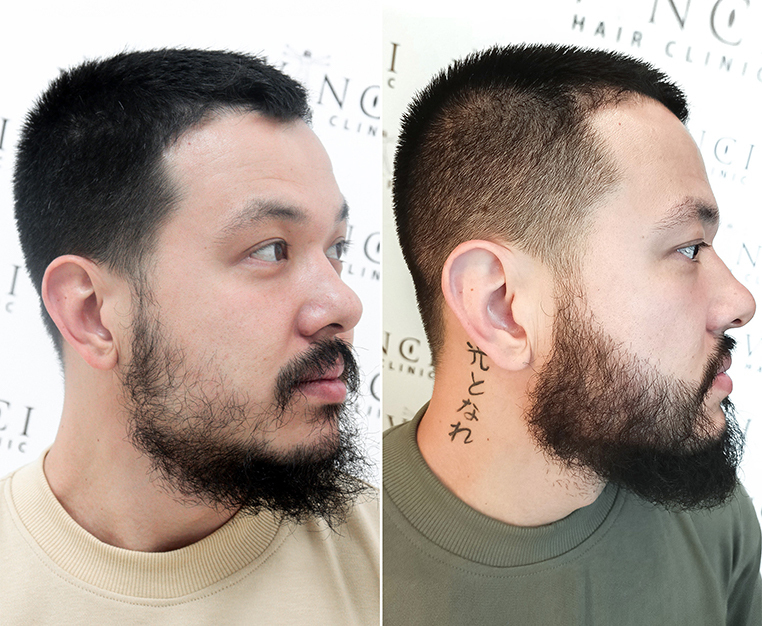Hair loss can be a puzzling and upsetting issue that prompts many to search for reasons for this problem. The experience of seeing strands of hair on your pillow, comb or in the shower can be distressing, begging the question, “My hair is falling out. What should I do?”
Addressing this issue requires an understanding of the factors contributing to hair loss and adopting a proactive approach to manage and potentially reverse the condition.
The signs of a receding hairline or thinning hair can be due to various factors that contribute to this issue.Firstly, let’s look at some of the reasons why your hair could be falling out:
- Inherited Hair Loss:
A significant aspect of hair loss is its hereditary nature. For some individuals, the process is gradual as hair follicles react to the hormone DHT.
- Nutrient Deficiencies:
A critical consideration in addressing hair loss is the role of nutrition. Inadequate intake of essential nutrients like iron, zinc, and vitamins can lead to weakened hair follicles and subsequent hair loss.
- Stress-Induced Hair Loss:
The impact of stress on hair health is noteworthy. Whether chronic or sudden, elevated stress levels have been identified as a contributing factor to hair loss. Stress hormones disrupt the natural hair growth cycle, resulting in increased hair fall.
- Environmental Factors:
Beyond internal factors, external elements play a role in hair health. For example, harsh chemicals found in certain hair products and exposure to air pollution can pose risks to the overall well-being of hair. Paying attention to environmental influences is crucial.
- Unhealthy Lifestyle Choices:
The correlation between lifestyle habits and hair health is evident. Unhealthy behaviours such as smoking can impede blood flow to the scalp, affecting your hair; while excessive alcohol consumption may disrupt hormone balance, leading to hair loss.
- Health Conditions and Hair Loss:
The presence of underlying health conditions further complicates the issue of hair loss. Conditions like thyroid problems or autoimmune diseases can disrupt the normal hair growth cycle, resulting in noticeable thinning or bald spots.
So, What Should You Do When Your Hair Is Falling Out?
The first step in addressing hair loss is consulting with a professional. A reputable hair clinic, equipped with experienced specialists, can perform a thorough examination to determine the cause of your hair loss. This step is crucial for developing a personalised plan tailored to your specific needs.
Once the cause is identified, the next phase involves adopting lifestyle changes and incorporating targeted treatments.
A balanced diet rich in vitamins and minerals, particularly those essential for hair health like biotin and iron, can make a significant difference. Hydration is equally important, as water intake supports overall bodily functions, including hair growth.
Reducing stress through relaxation techniques and ensuring adequate sleep can positively impact hair health. Avoiding tight hairstyles and limiting the use of heat-styling tools can prevent further damage. Choosing gentle, nourishing hair products specifically designed for your hair type is also essential.
For genetic or hormonal causes, pharmaceutical interventions like minoxidil and finasteride may be recommended, stimulating hair growth. In cases where medications fall short, hair transplant procedures offer a more effective solution.
Hair transplants involve the surgical relocation of healthy hair follicles from areas of robust growth (often the back or sides of the head) to areas experiencing thinning or baldness. This process ensures that the transplanted hair continues to grow in its new location, providing a natural and long-lasting solution.
The decision to undergo a hair transplant should be made in consultation with a qualified specialist who can assess your specific situation. During the consultation, factors such as the extent of hair loss and donor hair availability are assessed for a personalised plan. Advanced therapies like platelet-rich plasma (PRP) may also be integrated.
PRP involves drawing a small amount of the patient’s blood, processing it to concentrate growth factors, and then injecting the PRP into the scalp. This technique aims to stimulate hair follicles, encouraging regrowth and improving the overall health of the existing hair.
It’s important to note that while hair transplants and advanced therapies can yield remarkable results, they are not one-size-fits-all solutions. The success of these interventions depends on various factors, and an individualised approach is crucial for optimal outcomes.
Are You Looking for an Effective Solution That Addresses Your Hair Loss?
Consulting with professionals at Vinci Hair Clinic is your first step to reclaiming confidence. Specialising in personalised plans, Vinci offers advanced interventions like hair transplants and PRP therapy.
Our experienced specialists will assess your unique needs to develop personalised solutions for lasting results. Take charge of your hair loss journey with Vinci – where expertise meets excellence.
Schedule your consultation today!


